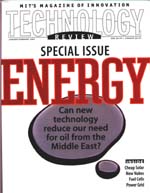MIT's Magazine of Innovation, Technology Review, (Jan/Feb, 2002), has a special issue (cover picture attached) entitled, "ENERGY: Can new technology reduce our need for oil from the Middle East?" IRI applauds the MIT question which we have been answering in the affirmative for three years now. With MIT's full-length articles on "Getting Over Oil", "Whose Nuclear Waste?", "Electricity Goes to Market", "Hitting the Natural-Gas Jackpot", "The Next Nuclear Plant", "Solar on the Cheap", and "Fuel Cells vs. The Grid", the magazine only addresses conventional answers that have shortcomings and not any new technology! (IRI notes that there are incremental changes which is the norm and then there is discontinuous innovation which IRI supports as the real definition of new technology. See Fourth Generation R & D by Miller and Morris for more details about how mainstream this distinction is in business and industry.)

The bottom line is revealed in the Leading Edge column by the Editor-in-Chief called "Energy Futures." Here John Benditt notes that cheap oil "has removed the motivation for research and development into energy alternatives. Unless we can restore it, we're headed for trouble--big trouble...The solution? Finding a way to accelerate innovation in energy technology." However, his new columnist, Michael Schrage, begins his first column, In the Weeds, by saying, "The problem isn't figuring out how to get people to become more 'innovative'; it's figuring out how to get people to accept and apply innovations more productively." This apparent battle between columnists is a sad example of the usual energy discord. IRI sides with the new boy on the street. We feel he is right and IRI fully supports Michael's concept that plenty of innovations are out there and that established institutions need to "rethink what it means to bring ideas to markets." His solution is: "Sometimes--particularly during innovation gluts--it might be smarter to bring markets to ideas." However, no one in the entire MIT Technology Review magazine is addressing the 20 million barrels per day of oil that America consumes presently and the 25 that is projected for 2020. Even the Charles Mann article "Getting Over Oil" only states at the end, "Even energy research has hit hard times...declining steadily for 20 years...by more than two-thirds in real terms" and that "the crystal ball is as murky as ever." We already know that! (The USEA meeting last month here in DC confirmed that only a couple of new power generation plants per year are being approved in the US, effectively killing the White House plan for 100 per year.)
Since this email message goes to many energy researchers, we recommend that your suggested energy solutions could and should be emailed to: Michael.Schrage@technologyreview.com or John.Benditt@technologyreview.com or Charles.Mann@technologyreview.com. Take a few minutes to educate them about your work or your colleague's work. The National Resources Defense Council www.nrdc.org recommends an "Apollo Project" for energy. Several other organizations, including IRI, call for a "Manhattan Project" for energy research and development. (See "Future Energy" position paper on IRI website.) Either title implies the same megafunded energy initiative. Perhaps this is the area where conferences serve a useful and vital purpose to attract marketers, especially those conferences dealing with energy futures. We suggest the Proceedings of the Conference on Future Energy to start, available on CD (and free COFE book) from IRI: www.integrity-research.org. Other energy conferences are in the works, such as: www.hannoverfair.com on April 15-20, 2002, with future-oriented energy in one of the conference sections. Another is the World Future Society Conference www.wfs.org in Philadelphia, July 20, 2002 where IRI will be exhibiting this year. Also suggested is Wharton's Technology Conference Feb. 22, 2002 also in Philadelphia, PA www.whartontechconference.com. How technology is transforming existing industries and creating new ones will be explored at "The Innovation Economy" which is MIT Technology Review's Biennial Conference www.technologyreview.com/tr100 with one hundred selected innovators. IRI also recommends university introduction of future energy courses such as Prof. Hideo Kozima's only known lecture course on Cold Fusion (Jan.-Mar. 2002) at Portland State University, Course PH410/510. A wonderful general textbook on the future of energy, including nonconventional energy solutions, is the Alternative Energy Institute's 2001 book, Turning the Corner: Energy Solutions for the 21st Century www.altenergy.org also available from IRI. Our forthcoming 2002 book, Zero Point Energy: The Fuel of the Future! will also be adaptable for college or university course curricula.
Return to Table of Contents.
*******************************************************